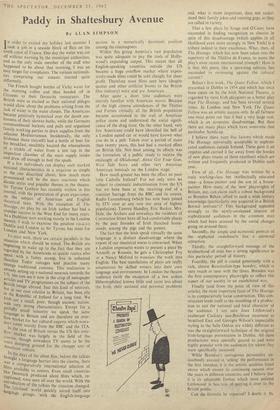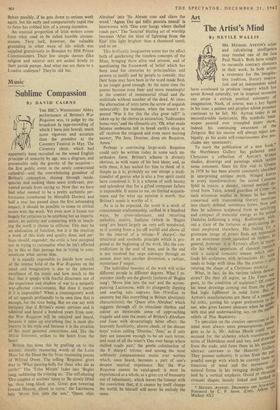Paddy in Shaftesbury Avenue
By ALAN SIMPSON
TN order to extend my holiday last summer I 'took a job in a seaside block of fiats on the south coast of France. One day the water was cut off without warning by the municipal authorities, and as the only male member of the staff who happened to be about that morning, -I was an easy target for complaints. The various nationali- ties comprising our tenants reacted quite differently.
The French bought bottles of Vichy water for the morning coffee and then headed off in Citroens to their favourite restaurants. The British were as excited as their national phlegm would allow about the problems arising from the lack of water in the water closets. The Americans became positively hysterical over the dumb use- lessness of their shower-baths, while the Germans commandeered buckets and pails and organised family working parties to draw supplies from the adjacent Mediterranean. Incidentally, the only Irishman there (myself) had a bottle of beer for his breakfast, stealthily located the whereabouts of a trickle of water from a test tap in the inspection chamber of the main supply intake and drew off enough to boil the spuds. If a few individuals can display such marked national characteristics in a situation as simple as the one described above, how much more pronounced will be the mass reactions which dictate styles and popular themes in the theatre.
Str Tyrone Guthrie has recently written in this journal, with the penetration of great experience, on the subject of American and English theatrical taste. With the exception of The Hostage, no play by an Irish author has had a Popular success in the West End for many years. As a Dubliner now working mostly in the London theatre, I wish to examine the position vis-d-yis Dublin and London as Sir Tyrone has done for London and New York.
To start with, there are certain parallels in the situation which should be noted. The British are beginning to wake up to the fact that they are regarded by the Americans as quaint rustics who
speak with a funny accent, live in unheated thatched Tudor cottages and practise many strange traditional customs. This realisation is already setting up a national neurosis towards the
US; one can see it now in the crop of newspaper articles and TV programmes on the subject of the British image abroad. just this kind of neurosis, but in our case relative to Britain, has been rife to the Republic of Ireland for a long time. We Irish are a small, poor, though ancient, nation. with very strong characteristics. Except for a
language small minority we speak the same nanguage as Britain and are therefore an over- flow market for her cultural exports which nowa- days come mainly from the BBC and the 1TA.
the case of Britain versus the US this over- ". Iv market was largely in the field of the cinema though nowadays TV seems to be the main dumping ground for the cheaper sort of American culture. In the days of the silent film, before the talkies brought a language barrier into the cinema, there
was a comparatively international selection of ,n.nns available to renters. Even small countries Denmark produced silent films which, re- captioned were seen all over the world. With the
The of the talkies the situation changed.
T he `civilised' world quickly sorted itself into language groups, with the English-language
section in a numerically dominant position among the cinemagoers.
Within this group America's vast population was quite adequate to pay the costs of Holly- wood's expanding output. This meant that all English-speaking countries outside the US became a huge overflow market where expen- sively-made films could be sold cheaply for sheer profit. Therefore most films seen here (despite quotas and other artificial boosts to the 'British film industry) were and are American.
After quite a short time audiences were entirely familiar with. American mores. Because of the high cinema attendances of the Thirties and Forties virtually all the British population became accustomed to the wail of American police sirens and understood the social signifi- cance of the drug store. On the other hand, very few Americans could have identified the bell of a London squad car or would have known what you do in a pub. Taken over a period of more than twenty years, this had had a marked effect on British life. Not least among its effects was the formation of a public ready to receive the onslaught of Oklahoma!, Annie Get Your Gun, West Side Story and other very American American musicals on the London stage. '
How much greater has been the effect on poor little Catholic Ireland? For not only were we subject to cinematic indoctrination from the US but we have been at the receiving end of a constant barrage from the BBC and its cousin, Radio Luxembourg (which has now been joined by ITV over at any rate our area of highest population). Tommy Handley, Eric Barker, Mrs. Dale, the Archers and nowadays the residents of Coronation Street have all had comfortable places by the peat firesides of Irish thatched home- steads, among the pigs and the poteen.
The fact that the Irish speak virtually the same language is a distinct disadvantage where the export of our theatrical wares is concerned. When a London impresario wants to present a piece by Anouilh or Roussin, he gets a Christopher Fry or a Nancy Mitford to translate the work into English. The best translations of plays are really adaptations by skilled writers into their own language and environment. In London the theatre audience (with the exception of a few ardent Hibernophiles) knows little and cares less about the Irish, their national and personal problems
and, what is more important, does not undet- stand their family jokes and running gags, as they are called in variety.
That a few plays by Synge and O'Casey have succeeded in finding recognition as classics in spite of this disadvantage (which applies, in all likelihood even more strongly in New York) is a tribute indeed to their excellence. What, then, of The Hostage, which has now been taken into the repertory of the Theatre de France, to name the play's most recent international triumph? How is it that this piece, like a spawning salmon, has succeeded in swimming against the cultural current?
Behans first work, The Quare Fellow, which I presented in Dublin in 1954 and which has since been taken on by the Irish National Theatre, is regarded by most Irish playgoers as a better play than The Hostage, and has been revived several times. In London and New York The Quare Fellow was an artistic success only. In all fairness one must point out that it had a very large cast, which is an economic disadvantage. But then there are many plays which have overcome that particular handicap.
I believe there were five factors which made The Hostage universally acceptable to sophisti- cated audiences outside Ireland. These gave it an impetus and carried it far away from the hordes of new plays (many of them excellent) which are written and frequently produced in Dublin each year.
First of all, The Hostage was written by a truly working-class but intellectually educated man—a house-painter and the son of a house- painter. How many of the 'new' playwrights of Britain, say, can claim such a robust background as Brendan Behan, allied to such a wide literary knowledge (particularly one acquired in a British Borstal institute!)? This background appealed strongly to the newly-awakened interest of sophisticated audiences in the common man which had been aroused by the social changes going on around them.
Secondly, the simple and economic portrait of the orphaned sweethearts has a universal attraction.
Thirdly, the straightforward message of the brotherhood of man has a strong significance in this particular period of history.
Fourthly, the pill is coated generously with a rich, almost Restoration-type bawdry, which is very much in tune with the times. Brendan was the first contemporary playwright to reflect this aspect of our society in an uninhibited way.
Finally (and from- the point of view of this article), the most important facet of The Hostage is its comparatively loose construction. This con- struction lends itself to the moulding of a produc- tion to suit the national and local character of the audience. I am sure Joan Littlewood's exuberant Cockney neo-Brechtian treatment at Stratford East and Georges Wilson's impeccable styling in the Salle Odeon are widely different as was the straightforward technique of the original Irish-language presentation in Dublin. All these productions were specially geared to and were highly popular with the audiences for whom they were specifically mounted.
While Brendan's outrageous personality un- doubtedly assisted in 'selling' the performance in the first instance, it is the artistic qualities listed above which ensure its continuing success over the years in different countries, and I believe that it is its adaptable format which most assisted Littlewood in hea task of putting it over to the British public..
Can the formula be repeated? I doubt it. By Behan possibly, if he gets down to serious work again, but his early and comparatively rapid rise to fame has robbed him of a strong incentive.
An unusual proportion of Irish writers come from what used to be called humble circum- stances. They lack, however, the valuable grounding in other ways of life which was supplied gratuitously to Brendan by HM Prison Commissioners. Their few simple themes (like religion and natural sex) are nailed firmly to their parish pumps. And what use are these to a London audience? They're old hat.





























 Previous page
Previous page